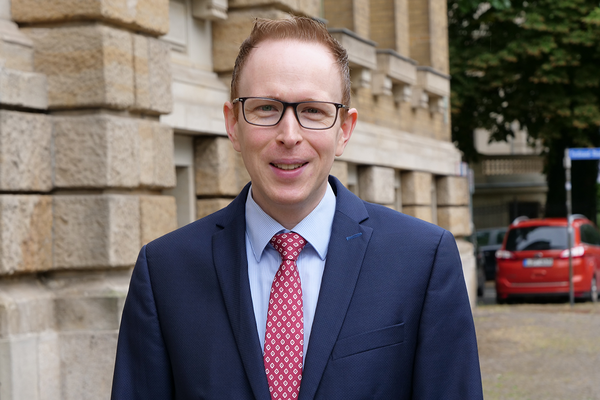Professor Bode would like to actively involve his students in the new research area of "Electric Flying", as electromobility in the air will become even more important in the future.
A. Schreyer: Prof Bode, you have held the Chair of Electrical Machines at the Faculty of Engineering since January 2021. What are your new areas of responsibility as a professor?
Prof Bode: "Electrical machines" is the academic term for electric motors and generators. In many places in our everyday lives, it's about moving something. We often use electric motors without realising it. Just think of your home: you brush your teeth electrically, the hoover and dishwasher work electrically, the printer feeds the paper automatically, the circulation pump ensures that it is warm in our living rooms. And when we leave the house, it continues: the tram runs on electricity and more and more cars and bicycles do the same. In addition, there are countless drive tasks in industry, almost all of which are performed with the help of electric motors. And on the other side is the provision of electrical energy by generators. This alone shows the breadth of the field and its importance to society.
Against the backdrop of climate change, the aim is to make these drive processes as energy-efficient as possible. This is not just about the electrical machine itself, but also about its interaction with other components in the overall system. An electric car is a good example of this: not only does it need an efficient motor, but the entire car must be efficient. But electromobility is not just about pedelecs and cars. The autonomous air taxis that keep popping up in the press usually have an electric drive. In general, the topic of "electric flying" will become increasingly important over the next few years. Completely new, very exciting challenges await in terms of the engine.
In the Bachelor's programme (EIB), I give the basic lectures "Design" and "Materials in Electrical Engineering" as well as the "Electromechanical Energy Conversion" part of the "Fundamentals of Electrical Power Engineering" module. I offer the module "Electrical Machines" in the Energy Technology specialisation. I am involved in the "Fundamentals of Electrical Drives" module for the automation technology specialisation.
In the Master's programme (EIB), I teach the modules "Theory of Electrical Machines" and "Calculation Elements of Electrical Machines".
A. Schreyer: How did you decide to specialise in this area of research and teaching? Did you already know what path you wanted to take before you started your studies?
Prof Bode: I was already interested in technology as a teenager. Through tinkering with electronics, amateur radio and youth research, I knew relatively early on that I wanted to study electrical engineering. That's what I did at the TU Braunschweig after leaving school. Originally, I wanted to specialise in communications engineering or high-frequency engineering. In the end, however, I chose power engineering, specialising in drive technology.
I came to electrical machines through my interest in electromagnetic fields. I wrote my student research project and diploma thesis in this field. Both theses were well received by the department, so I stayed on as a research assistant at the institute after completing my studies. There, I worked on the calculation of eddy current effects in electrical machines, among other things, and eventually completed my doctorate in this field.
Before I was appointed to the HTWK, I worked in industry. I worked as a calculation engineer in motor development at Heidenhain. I then moved to NORD Drivesystems. Before my appointment as head of department, I was responsible for the electrical part of motor development there.
A. Schreyer: What skills and interests do you think students who decide to study "Electrical Engineering and Information Technology" should have?
Prof Bode: Students should be enthusiastic about technology and technical contexts and have the ambition to want to understand how such things work. An essential key to understanding is (applied) mathematics. Without it, nothing works in the degree programme and later in your career. You should also have a certain practical inclination. Engineers are generally interested in a pragmatic description of interrelationships and the resulting application.
A. Schreyer: What new projects would you like to realise in the future?
Prof Bode: For example, I find the topic of "electric flying" very interesting. It is important to me to actively involve students in these new topics. This offers incredible potential. Budding engineers often try unconventional approaches and come up with creative, often promising solutions.
In the medium term, I am planning to set up a test rig for measuring electromagnetic energy converters. This will then be available for internships and student work as well as for research projects.
However, I am particularly looking forward to working with my colleagues at the Institute of Electrical Power Engineering. We have a very broad range of specialisms and cover the entire field. That is quite rare. This offers enormous potential for joint projects.
